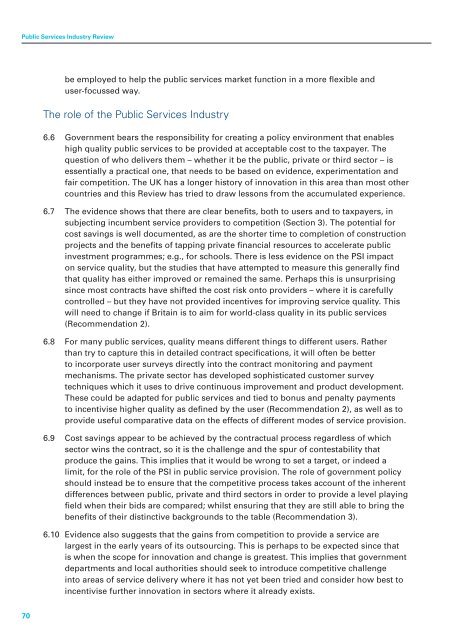Understanding the Public Services Industy
Understanding the Public Services Industy
Understanding the Public Services Industy
You also want an ePaper? Increase the reach of your titles
YUMPU automatically turns print PDFs into web optimized ePapers that Google loves.
<strong>Public</strong> <strong>Services</strong> Industry Review<br />
be employed to help <strong>the</strong> public services market function in a more flexible and<br />
user-focussed way.<br />
The role of <strong>the</strong> <strong>Public</strong> <strong>Services</strong> Industry<br />
6.6 Government bears <strong>the</strong> responsibility for creating a policy environment that enables<br />
high quality public services to be provided at acceptable cost to <strong>the</strong> taxpayer. The<br />
question of who delivers <strong>the</strong>m – whe<strong>the</strong>r it be <strong>the</strong> public, private or third sector – is<br />
essentially a practical one, that needs to be based on evidence, experimentation and<br />
fair competition. The UK has a longer history of innovation in this area than most o<strong>the</strong>r<br />
countries and this Review has tried to draw lessons from <strong>the</strong> accumulated experience.<br />
6.7 The evidence shows that <strong>the</strong>re are clear benefits, both to users and to taxpayers, in<br />
subjecting incumbent service providers to competition (Section 3). The potential for<br />
cost savings is well documented, as are <strong>the</strong> shorter time to completion of construction<br />
projects and <strong>the</strong> benefits of tapping private financial resources to accelerate public<br />
investment programmes; e.g., for schools. There is less evidence on <strong>the</strong> PSI impact<br />
on service quality, but <strong>the</strong> studies that have attempted to measure this generally find<br />
that quality has ei<strong>the</strong>r improved or remained <strong>the</strong> same. Perhaps this is unsurprising<br />
since most contracts have shifted <strong>the</strong> cost risk onto providers – where it is carefully<br />
controlled – but <strong>the</strong>y have not provided incentives for improving service quality. This<br />
will need to change if Britain is to aim for world-class quality in its public services<br />
(Recommendation 2).<br />
6.8 For many public services, quality means different things to different users. Ra<strong>the</strong>r<br />
than try to capture this in detailed contract specifications, it will often be better<br />
to incorporate user surveys directly into <strong>the</strong> contract monitoring and payment<br />
mechanisms. The private sector has developed sophisticated customer survey<br />
techniques which it uses to drive continuous improvement and product development.<br />
These could be adapted for public services and tied to bonus and penalty payments<br />
to incentivise higher quality as defined by <strong>the</strong> user (Recommendation 2), as well as to<br />
provide useful comparative data on <strong>the</strong> effects of different modes of service provision.<br />
6.9 Cost savings appear to be achieved by <strong>the</strong> contractual process regardless of which<br />
sector wins <strong>the</strong> contract, so it is <strong>the</strong> challenge and <strong>the</strong> spur of contestability that<br />
produce <strong>the</strong> gains. This implies that it would be wrong to set a target, or indeed a<br />
limit, for <strong>the</strong> role of <strong>the</strong> PSI in public service provision. The role of government policy<br />
should instead be to ensure that <strong>the</strong> competitive process takes account of <strong>the</strong> inherent<br />
differences between public, private and third sectors in order to provide a level playing<br />
field when <strong>the</strong>ir bids are compared; whilst ensuring that <strong>the</strong>y are still able to bring <strong>the</strong><br />
benefits of <strong>the</strong>ir distinctive backgrounds to <strong>the</strong> table (Recommendation 3).<br />
6.10 Evidence also suggests that <strong>the</strong> gains from competition to provide a service are<br />
largest in <strong>the</strong> early years of its outsourcing. This is perhaps to be expected since that<br />
is when <strong>the</strong> scope for innovation and change is greatest. This implies that government<br />
departments and local authorities should seek to introduce competitive challenge<br />
into areas of service delivery where it has not yet been tried and consider how best to<br />
incentivise fur<strong>the</strong>r innovation in sectors where it already exists.<br />
70
















